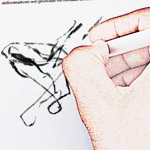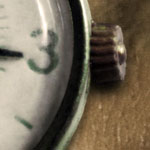“You’re here for the eleven o’clock interview?” she asks.
“That sounds about right,” I say, feeling lost. “Since I can’t seem to find my desk.” The receptionist squints a smile and makes a single-note hum, which I find unsettling. This musical acknowledgement isn’t new to me, in fact I’m quite familiar with the practice. Nicole from my office does the exact same thing–that curious tonal response, “Mm!” Thing is, it’s always been endearing when Nicole does it because it’s hers. Now, with this girl pulling the same schtick?
She’s caught me off guard, but once I’ve made the realization it’s obvious. Suspicion eclipses any sense of rapport. I have half a mind to call her on her infringement. “Nice hum you have there,” I could say. “Zat something you just came up with all on your own?” Then, like lightning, I grab her mouse and sprint back out the front door.
As the receptionist sends off an instant message, I study her profile. Amazing: she looks like Nicole, too, except that her cheekbones are shallower. Her hair is a touch lighter too, with a kinkier curl, and her eye color is all wrong. If I didn’t know Nicole I wouldn’t even recognize the inconsistencies, but there they are.
The thing that sticks in my craw is that there’s a Nicole-like person doing Nicole-like things, and everyone around her will just assume that she’s the original, when in plain fact this is a myth, and an easily dispelled one at that. Anyone who saw them side by side would understand that this receptionist entity is nothing more than a hastily-cobbled together knock-off; a puppet drone blandly mirroring the real deal.
Still, this receptionist, the impostor, sends me to the couch to wait for my appointment.
“Hey, Chet, howzit going?” she says moments later. I look up and see Chet easing on over to Nicole’s doppelganger. Chet’s just like our lead programmer Erskine, it turns out. He even saunters the same way, in spite of being pigeon-toed. Same floppy ears though, same steam shovel jaw. Chet’s the laid-back guy with a slow sense of humor, and that one sideways tooth. Only he’s duller than Erskine, like the mold got gummy after the first pressing. Secretly I hate them both for blatantly perpetuating this deception.
“Hey, Michele,” he says, and I can’t help but snort. Michele, is it? They both glance over at me for a moment, but I make like I’m working some gristle out from between my molars with my pinky, and they avert their eyes.
When I look back at them, Chet is leaning over Michelle’s desk and planting a peck on Michele’s cheek. Wait, so Chet and Nicole are an item? Michele, I mean. Chet’s obviously unaware that Erskine is gay. See, and that’s the show-stopper. If you’re going to impersonate someone then you can at least strive for accuracy.
Continue reading
 Lord of his demesne, the bookstore proprietor fixes me in his gaze as I fill out the form. More accurately, he watches my hand, scrutinizes its every movement. This is an intense man covered in tattoos, an unlikely combination. You’d think that someone who can take a needle in the eyelid might have a more placid bearing. But then again, maybe his friends did this to him as a prank after one of his late-evening post-binge blackouts.
Lord of his demesne, the bookstore proprietor fixes me in his gaze as I fill out the form. More accurately, he watches my hand, scrutinizes its every movement. This is an intense man covered in tattoos, an unlikely combination. You’d think that someone who can take a needle in the eyelid might have a more placid bearing. But then again, maybe his friends did this to him as a prank after one of his late-evening post-binge blackouts. Okay, I’ll admit it: most of what I know is made up; a complete fabrication as a defensive measure against the alarming banality of truth. As such, the line between the two worlds–between truth and fabrication–is sometimes indistinct. The defining factor seems to be the number of unicorns involved in a given thought. Of course there is no profit in revealing this fact to my adversaries.
Okay, I’ll admit it: most of what I know is made up; a complete fabrication as a defensive measure against the alarming banality of truth. As such, the line between the two worlds–between truth and fabrication–is sometimes indistinct. The defining factor seems to be the number of unicorns involved in a given thought. Of course there is no profit in revealing this fact to my adversaries. Officer… Lindstrom. Her badge catches the sun, and I’m blinking the spot from my eyes when she looks up at me from her small pad of lined paper. “And when did you first see the car?” Her notes are a disconcerting scribble. Do I really talk like that?
Officer… Lindstrom. Her badge catches the sun, and I’m blinking the spot from my eyes when she looks up at me from her small pad of lined paper. “And when did you first see the car?” Her notes are a disconcerting scribble. Do I really talk like that? When I was a lad I had a watch that was five minutes behind. Setting that watch at the beginning of each school day was part of my morning ritual, followed closely by the familiar litany: key, money, watch, belt, pencil. They were essential to my peace of mind, and had to be on my person before I set out for school.
When I was a lad I had a watch that was five minutes behind. Setting that watch at the beginning of each school day was part of my morning ritual, followed closely by the familiar litany: key, money, watch, belt, pencil. They were essential to my peace of mind, and had to be on my person before I set out for school. I’m distracted. I look up from the doodle on my post-it notepad and see the department manager, stem to torso, standing at his desk. I haven’t gotten used to it even though it’s been two weeks since he first decided to start standing. Let me be clear on this point: he no longer sits. Ever. His laptop rests atop a tower of stacked monitor stands, and an attached keyboard is placed such that his arms can reach it from a neutral position. It’s like he’s become an upright fundamentalist. I don’t think he has a chair in his office anymore, and even the family photos on his desk that depicted people sitting were removed by the custodial staff. At first I assumed that this elevated stature was designed to give him a crow’s nest vantage point over the cubicle farm, but now I remember the mean ergonomics lady.
I’m distracted. I look up from the doodle on my post-it notepad and see the department manager, stem to torso, standing at his desk. I haven’t gotten used to it even though it’s been two weeks since he first decided to start standing. Let me be clear on this point: he no longer sits. Ever. His laptop rests atop a tower of stacked monitor stands, and an attached keyboard is placed such that his arms can reach it from a neutral position. It’s like he’s become an upright fundamentalist. I don’t think he has a chair in his office anymore, and even the family photos on his desk that depicted people sitting were removed by the custodial staff. At first I assumed that this elevated stature was designed to give him a crow’s nest vantage point over the cubicle farm, but now I remember the mean ergonomics lady. I used to pretend that my pencil was a rocket. As my Grade 3 teacher broke the world into morsels digestible to eight year olds, I was launching golden missiles into space. I would squint with one eye open and, holding my Ticonderoga by the metal band around the eraser, move it steadily upward into my field of vision. Then, once the lead tip (or “nose cone”) had ascended out of view, I would deftly switch hands, grabbing the tip in my other hand while releasing the engine in time to see it sweep seamlessly by. Persistence of vision provided the illusion of unassisted flight across a constellation of adolescent heads. This business was hardly subtle, and on more than one occasion I was spotted by the teacher, my attention compromised, and made to participate in undesirable activities.
I used to pretend that my pencil was a rocket. As my Grade 3 teacher broke the world into morsels digestible to eight year olds, I was launching golden missiles into space. I would squint with one eye open and, holding my Ticonderoga by the metal band around the eraser, move it steadily upward into my field of vision. Then, once the lead tip (or “nose cone”) had ascended out of view, I would deftly switch hands, grabbing the tip in my other hand while releasing the engine in time to see it sweep seamlessly by. Persistence of vision provided the illusion of unassisted flight across a constellation of adolescent heads. This business was hardly subtle, and on more than one occasion I was spotted by the teacher, my attention compromised, and made to participate in undesirable activities. I’ve come to understand that, in most cases, there is just one thing that is supposed to hold our attention. It’s usually the most obvious thing, and far more clever folk refer to it as “the thing right in front of you,” or “the task at hand.” Yet it could be anything. Whether we’re clipping off body parts and storing them in freezer bags, or filling our tax forms with bizarre scribbled figures, we know where our focus is supposed to be.
I’ve come to understand that, in most cases, there is just one thing that is supposed to hold our attention. It’s usually the most obvious thing, and far more clever folk refer to it as “the thing right in front of you,” or “the task at hand.” Yet it could be anything. Whether we’re clipping off body parts and storing them in freezer bags, or filling our tax forms with bizarre scribbled figures, we know where our focus is supposed to be. All this shuffling going on, and suddenly the barking guy is back. I remember the barking guy from a long time ago when he used to sit in my unit (“the ward”), and now the churn has popped him back up like a shell in the surf. This is the guy who spoke in short, staccato bursts, always peppering his Tourette cadence with authoritarian hand-chopping gestures. His manner to coworkers was always immaculately perfunctory, so he became an easy villain in the dramatic construct I fancied myself a player in. Of course I’m no protagonist–I’ve never been anything more than a background character in my own fantasies–but I’m certainly qualified to make such judgments about others.
All this shuffling going on, and suddenly the barking guy is back. I remember the barking guy from a long time ago when he used to sit in my unit (“the ward”), and now the churn has popped him back up like a shell in the surf. This is the guy who spoke in short, staccato bursts, always peppering his Tourette cadence with authoritarian hand-chopping gestures. His manner to coworkers was always immaculately perfunctory, so he became an easy villain in the dramatic construct I fancied myself a player in. Of course I’m no protagonist–I’ve never been anything more than a background character in my own fantasies–but I’m certainly qualified to make such judgments about others. All around me, decay. Even renewal is part of the decay, because it is part of a continuum I view through clouded lenses, and perceive with synapses beset by atrophy. So it is that I grew tired of playing the portrait to my operating system’s Dorian Gray.
All around me, decay. Even renewal is part of the decay, because it is part of a continuum I view through clouded lenses, and perceive with synapses beset by atrophy. So it is that I grew tired of playing the portrait to my operating system’s Dorian Gray.